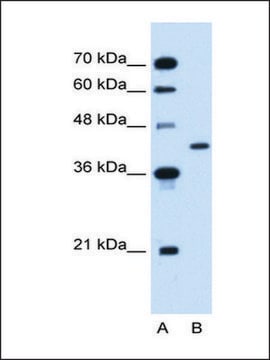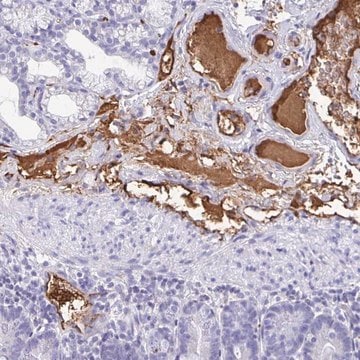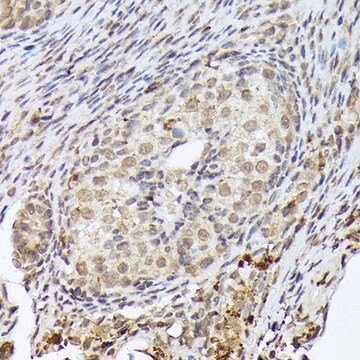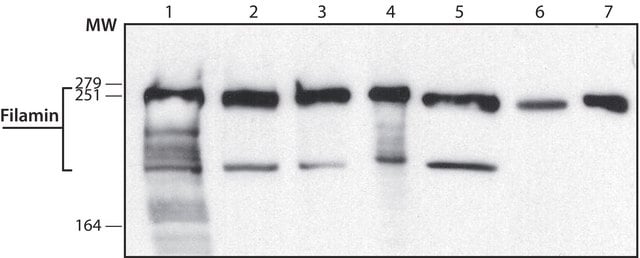General description
Fibrinogen is a soluble plasma glycoprotein (hexamer) composed of two sets of α, β and gamma polypeptides linked together by disulfide bonds. The C-terminals of these chains contain domains that function as molecular recognition units for other components of the coagulation cascade. For instance the Fibrinogen gamma chains a specific binding site of the ligand for platelet GPIIb/IIIa complex and FXIII-A(2)B(2) of plasma origin binds to thrombin-receptor activated platelets via GPIIb/IIIa receptor-bound fibrinogen with gamma′-chain. The fibrinogen gamma-module has several important sites that include the high affinity calcium binding site, hole ′a′ that binds with knob ′A′, and the D:D interface.
Specificity
Anti-FGG polyclonal antibody reacts with zebrafish, human, mouse, rat, pig, bovine, canine, and chicken fibrinogen gamma polypeptide subunits.
Immunogen
Synthetic peptide directed towards the middle region of human FGG
Application
Anti-FGG polyclonal antibody is used to tag fibrinogen gamma polypeptide subunits for detection and quantitation by Western blotting and in cells and tissues by immunohistochemical (IHC) techniques. It is used as a probe to study the possible roles of fibrinogen gamma polypeptide subunits in fibrinogen assembly and protein interaction especially during the coagulation cascade.
Biochem/physiol Actions
FGG is the gamma component of fibrinogen, a blood-borne glycoprotein comprised of three pairs of nonidentical polypeptide chains. Following vascular injury, fibrinogen is cleaved by thrombin to form fibrin which is the most abundant component of blood clots. In addition, various cleavage products of fibrinogen and fibrin regulate cell adhesion and spreading, display vasoconstrictor and chemotactic activities, and are mitogens for several cell types. Mutations in its gene lead to several disorders, including dysfibrinogenemia, hypofibrinogenemia and thrombophilia.The protein encoded by this gene is the gamma component of fibrinogen, a blood-borne glycoprotein comprised of three pairs of nonidentical polypeptide chains. Following vascular injury, fibrinogen is cleaved by thrombin to form fibrin which is the most abundant component of blood clots. In addition, various cleavage products of fibrinogen and fibrin regulate cell adhesion and spreading, display vasoconstrictor and chemotactic activities, and are mitogens for several cell types. Mutations in this gene lead to several disorders, including dysfibrinogenemia, hypofibrinogenemia and thrombophilia. Alternative splicing results in two transcript variants encoding different isoforms.
Sequence
Synthetic peptide located within the following region: RLTYAYFAGGDAGDAFDGFDFGDDPSDKFFTSHNGMQFSTWDNDNDKFEG
Physical form
Purified antibody supplied in 1x PBS buffer with 0.09% (w/v) sodium azide and 2% sucrose.
Disclaimer
Unless otherwise stated in our catalog or other company documentation accompanying the product(s), our products are intended for research use only and are not to be used for any other purpose, which includes but is not limited to, unauthorized commercial uses, in vitro diagnostic uses, ex vivo or in vivo therapeutic uses or any type of consumption or application to humans or animals.









